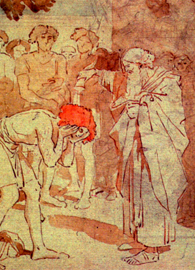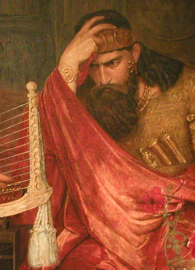1 & 2 Samuel Week 4
David Anointed, Saul’s Court, and Goliath: 1 Samuel 16–17
Seattle Pacific University Associate Professor of Biblical Studies
Read this week’s Scripture: 1 Samuel 16–17
16:47

 EnlargeA Beloved Figure
EnlargeA Beloved Figure
David’s name means “beloved,” and it is a fitting appellation for the person who is loved by God, by Israel, and by so many people throughout time. David’s appeal may be traced to his complexity, which is evident in two ways. First, David is complex because he is not one-dimensional; instead, he has different aspects to his character. He is a soldier who kills bears, lions, “ten thousands” of enemies (1 Samuel 18:7), and even a giant. He is also a musician and poet. He fits the description of a Renaissance man with his different areas of expertise.
The second reason David is complex is because he is not whitewashed by the text, but instead is presented as being thoroughly human, including having doubts and making mistakes. His humanness is what makes his description as “a man after [God’s] own heart” (1 Samuel 13:14) so compelling. It urges us to understand that our own imperfections and limitations do not disqualify us from also being people after the heart of God. Indeed, though these biblical books are titled after Samuel, it is David who is the main character from here on out [see Author’s Note 1].
But David’s introduction in the text is a little underwhelming, especially given that he is the beloved and paradigmatic king of Israel. He was hinted at in 1 Samuel 13, when God told Saul that he had chosen a man after his heart (13:14), but David’s name is not even mentioned until halfway through chapter 16, the chapter in which he will be anointed. Apparently he is forgotten by his father (16:11), and even though God has told Samuel in 16:3 that God will name the one Samuel is to anoint, God later identifies David by simply saying, “this is the one” (16:12). In fact, throughout 1 Samuel 16–17, David is overshadowed by three people who are larger and more important than he is: his brother Eliab, King Saul, and the giant Goliath. Perhaps the smallness of David’s stature is part of what makes him so endearing.
A King Among Jesse’s Sons
1 Samuel 16 starts with grief, something that carries over from the end of the previous chapter when Samuel mourns Saul and God is sorry that God has made Saul king (15:35). Here God asks Samuel a rhetorical question about how long he will continue to grieve, and then commands Samuel to go anoint one of Jesse’s sons. Jesse was named in Ruth 4:17–22 — he is from Bethlehem in Judah, in the line of Perez.
Samuel’s emotion of grief, which began chapter 16, gives way to the feelings of trepidation and fear — feelings shared by the elders of Israel who are trembling when they come to meet Samuel in 16:4. But they are fearful for different reasons: Samuel is afraid of what Saul will do to him if Saul finds out that Samuel has anointed another, while the elders of Bethlehem ask if Samuel has come peaceably. Such a question reminds us that before Saul was anointed king, Samuel held the power over Israel, and as a “kingmaker” Samuel still has a tremendous amount of power. But Samuel reassures the elders, calling them and Jesse to a sacrifice.
When Samuel sees Jesse’s eldest son Eliab, Samuel thinks he is the one who will be king because of his looks — specifically Eliab’s appearance and height (16:7). Remember that when Saul was first introduced in 9:2, he was described as handsome and tall; he looked like royalty! But God reminds Samuel (and readers of the text) that there are differences in what God sees and what humans see. Specifically, humans focus on the outside appearance while God sees the heart. Now, David is also “handsome,” has “beautiful eyes,” and is “ruddy” (1 Samuel 16:12) [see Author’s Note 2]. But the point is that David is not chosen for his attractive appearance.
After Samuel learns that Eliab is not the chosen one, Jesse brings out his other sons before Samuel. But none of them are chosen either. Eliab, Abinadab, and Shammah — the three that follow Saul to battle in chapter 17 — are mentioned by name, but a total of seven sons pass before Samuel. Seven is a biblical number that represents completion and perfection, so seven sons would be the perfect, full number of sons. David is the eighth son (cf. 1 Samuel 17:12), and therefore in some sense could be considered an afterthought, as he seems to be for his father [see Author’s Note 3].
After the parade of the seven older sons, Samuel admits to Jesse, “The LORD has not chosen any of these” (16:10). Though the biblical text typically gives no information as to the tone of speeches, I imagine Samuel saying this with either a plaintive tone or with some embarrassment. I also imagine him pausing before asking his next question, “Are all your sons here?” and breathing with relief when Jesse answers that there is another one, the youngest, who is out keeping the sheep (16:11).

 EnlargeSpirit(s) of the LORD
EnlargeSpirit(s) of the LORD
The right person finally having been identified, Samuel then anoints David, and God’s spirit comes upon David. We find an important detail in the middle of the verse, as 16:13 adds that God’s spirit is on David “from that day forward.” In other words, God’s spirit will not leave David [see Author’s Note 4]. This contrasts with Saul in the verse immediately following, which tells us that “the spirit of the LORD departed from Saul” (16:14). Notice the active agency of the spirit; it is not that Saul lost God’s spirit, but that it left him. As if that were not bad enough, the verse continues by saying, “and an evil spirit from the LORD tormented him” (16:14).
There are different ways to understand this disconcerting verse. Some have explained it in terms of a mental illness. Their rationale is that the authors of the biblical text likely could not understand the complexities of the chemical makeup of the human brain [see Author’s Note 5], and instead explained disorders like depression and paranoia as having spiritual origins. This explanation could be helpful if it becomes a springboard for the Church to talk about mental illness, an issue that affects approximately one in four Americans. However, I am deeply concerned that such an interpretation, if not carefully discussed, could perpetuate the ways that the Church blurs the lines of the medical and the supernatural, or stigmatizes mental illness in ways that it does not stigmatize diseases like cancer. If Saul had a mental illness, that is not the same thing as an evil spirit from the LORD tormenting him [see Author’s Note 6].
One reason why people might want to explain 1 Samuel 16:14 in terms of mental illness is a discomfort with the theological implications of the verse. It is particularly troubling that there is even such a thing as an “evil spirit from the LORD.” But as Hans Hertzberg wrote, “Saul’s suffering is described theologically, not psychopathetically or psychologically” [see Author’s Note 7]. Therefore, another way to interpret this verse is to take it more literally, paying attention to the literary details and context of the text. Barbara Green explains that God helps those whom God chooses. Though God had initially chosen Saul, now that God has chosen another, God will not help Saul anymore.
Green also notes that Saul is “a walking dead man,” as can be seen in Samuel’s action of mourning him [see Author’s Note 8]. While some have understood the “evil spirit” as a separate spirit that rushes into the vacuum left by God’s vacating spirit, Everett Fox disagrees. Instead, Fox explains that God’s spirit had previously been a gift to Saul, but now is “a torment” [see Author’s Note 9].
Even those explanations may not be very satisfying. A colleague of mine told me that, for her, this is one of the most frightening exchanges in the Bible. I agree, and as I mentioned in the Lectio for 1 Samuel 8–15, I understand Saul as a tragic figure. The text does not give us simplistic or simple answers about Saul, but moves on to Saul’s servants, who confirm that it is a spirit from God who is tormenting Saul. Other servants recognize that David’s skill in playing music might provide relief for Saul, and that turns out to be true (16:23). At this point in the story, Saul states that David has his favor (16:22). There is some ambiguity in 16:21, however, as the Hebrew says “and he loved him” without clarifying the identity of the subject and object. It could be that David loves Saul, but many English translations specify that it is Saul who loves David. Again, as previously discussed, David is “beloved.”
David and Goliath
This story is certainly one of the greatest hits in the Old Testament. It gets told to children along with the story of Noah and the ark, Daniel in the lion’s den, and Jonah and the “whale.” And it is not only a children’s story; in 2013, Malcolm Gladwell published the book David and Goliath: Underdogs, Misfits, and the Art of Battling Giants, discussing how this story has become a “metaphor for improbable victory.”
What happens in the story can be told very briefly: Small, young David uses a stone and slingshot to kill the giant warrior Goliath. But certain details are worth noting about the characters, especially how they are described, what they do, and what they say.
Descriptions of the Characters
Goliath is the champion of the Philistines, those archetypal enemies of Israel. Previously, God had told Samuel that Saul would save the Israelites from the Philistines (9:16), so it is significant that it is not Saul who defeats Goliath, but David [see Author’s Note 10]. Goliath’s size and the weight of his armor are specifically mentioned. According to 17:4, Goliath was at least 6 feet 9 inches tall — though some ancient texts increase this measurement to 9 feet 9 inches — and his coat of armor weighed some 125 pounds (17:5), while just the blade of his spear weighed more than 15 pounds (17:7).
These measurements are noteworthy not only because Goliath is so big and strong, but also because the Old Testament often lacks such descriptions. In David’s case, for example, we have no similar description about his size, though Goliath’s taunt in 17:43 suggests that David is small. David’s youth, however, is mentioned twice in the chapter (17:33, 42), and could suggest a level of inexperience. As David himself notes, though, what he has done as a shepherd has prepared him for what is to come (17:34–37).

 EnlargeWhat the Characters Do and Say
EnlargeWhat the Characters Do and Say
Goliath asks for a single Israelite to fight against him in order to determine which nation will be the servants of the other. Goliath also defies, disdains, and curses the Israelites and their God. In response, the Israelites are terrified, and given Goliath’s physical prowess, no one offers to fight him. That remains the situation for forty days (1 Samuel 17:16; cf. Genesis 8:6, Exodus 24:18, etc.), at which time David comes to bring food to his brothers. When David hears Goliath’s challenges, David volunteers to fight.
Saul is understandably concerned, but when David insists, Saul gives David his own armor for protection. However, the text says twice in a single verse that David is not used to the armor (1 Samuel 17:39), so David takes it off and goes out to meet Goliath with only his sling and shepherd’s staff. What David is used to, however, is trusting in the LORD, speaking in the name of the LORD, and experiencing the LORD’s deliverance and help. This can be seen in David’s utter confidence — expressed to both Saul and Goliath — that David will triumph against Goliath with God’s help.
And David does triumph. The stone from his slingshot hits Goliath in the forehead — an unprotected part on this heavily armed warrior — and kills him. David then uses Goliath’s own sword to cut off Goliath’s head, and David subsequently takes the head to Jerusalem (17:54). David’s triumph enables the Israelites to also triumph. They chase the Philistines back to the border of their own country before returning to plunder the Philistine camp (17:52–53).
Obviously, there are a number of significant lessons to take away from this rich story. In this context, I suggest three. First, though David and the Israelites are indeed triumphant over Goliath and the Philistines, it is more accurate to say that this victory belongs to God. It is God in whom David places his trust and confidence, and it is God who gave power to the relatively weak over the strong, to the small over the giant. This is how God works: in reversals like those previewed in Hannah’s song (1 Samuel 2).
Second, David exemplifies the important habit of turning to God and seeing God at work. David has experienced God’s salvation from the paw of a bear or a lion (17:37), so David draws on that when he goes to fight Goliath. In fact, when David tells Goliath that God will give him victory, it is not a memorized or practiced speech. Instead, it is something David is used to, a pattern and practice in his life that enables him to be confident at this crucial moment.
Third, while David is beloved in ways that are unique among other biblical characters, there are a number of places in the New Testament that refer to every follower of God as “beloved” (Colossians 3:12; 2 Peter 3:1, 8, 14; 1 John 2:7; 4:1, 7, 11, etc.). David’s story can encourage each one of us to know and live in the confidence of the love of God.
Questions for Further Discussion:
- What do you think it means to be someone “after [God’s] own heart” (1 Samuel 13:14), as David is described? Would you describe anyone you know with this phrase?
- Samuel has anointed David, yet Saul is still king. How does God interact with both Saul and David? How do Saul and David interact with each other? What do these interactions reveal about each of these characters?
- In what ways has David already prepared to take on Goliath? How is David’s perspective on the battle different from that of Goliath, Saul, and the rest of Israel?
<<Previous Lectio Back to 1 & 2 Samuel Next Lectio>>

This work is licensed under a Creative Commons License.



